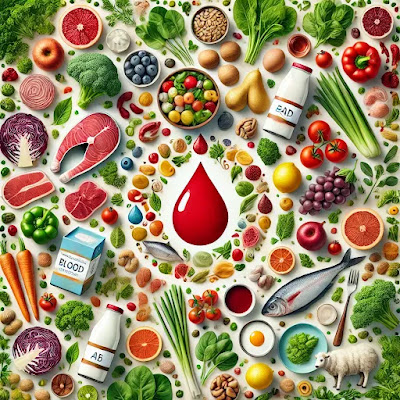Is Your Diet Secretly Working Against Your Blood?
Believe it or not, some experts believe that your blood type could hold the secret to your perfect diet. Imagine if the foods you eat daily are either fueling your health—or sabotaging it—all based on your blood type. Intrigued? Welcome to the world of the Blood Type Diet, a controversial approach that suggests your blood type could be the key to a healthier, more energized life.
What Is the Blood Type Diet?
Created by naturopathic physician Dr. Peter J. D’Adamo, the Blood Type Diet centers on the idea that each blood type (O, A, B, and AB) has specific dietary needs for optimal health. This theory, outlined in his bestselling book Eat Right 4 Your Type, suggests that foods that work well for one blood type might not suit another. Though it lacks unanimous scientific backing, the diet has attracted a following worldwide.
Let’s take a closer look at what Dr. D’Adamo claims each blood type should be eating, and why he believes it could impact everything from digestion to disease prevention.
---
Blood Type O: The “Hunter”
Who Are They?
People with Blood Type O are the "hunters" according to D’Adamo, descendants of ancient humans who survived by hunting and consuming high-protein diets. If you’re Type O, your body may thrive on animal proteins, lean meats, and high-intensity exercise.
Recommended Foods for Type O:
High-protein foods: Grass-fed meats, poultry, and fish
Fruits and vegetables: Kale, spinach, and broccoli
Nuts and seeds: Walnuts, pumpkin seeds
Avoid: Grains, beans, and dairy, which are said to cause digestive issues in Type O individuals
Why This Works for Type O:
The theory is that Type O individuals have higher stomach acid levels, making them better suited to digesting animal proteins but more likely to struggle with dairy and grains. Proponents believe this diet reduces inflammation and aids weight loss for Type O individuals.
---
Blood Type A: The “Agrarian”
Who Are They?
Known as the “cultivators,” Blood Type A individuals are thought to thrive on plant-based diets, much like their ancestors who settled into agricultural lifestyles. If you have Blood Type A, you may find your energy increases with a diet heavy in organic fruits, vegetables, and whole grains.
Recommended Foods for Type A:
Fruits and vegetables: Leafy greens, berries, carrots
Plant proteins: Tofu, lentils, beans
Whole grains: Brown rice, spelt, quinoa
Avoid: Red meat and dairy, which are thought to slow down the metabolism of Type A individuals
Why This Works for Type A:
Dr. D’Adamo theorizes that Type A individuals have lower levels of stomach acid, making it harder for them to digest meat. He recommends Type A individuals follow a vegetarian or near-vegetarian diet to reduce stress on the digestive system and boost immunity.
---
Blood Type B: The “Nomad”
Who Are They?
For Blood Type B, D’Adamo envisions the “nomads” or “wanderers,” who might thrive on a more varied diet. This group, he suggests, is adaptable to both animal and plant foods, though certain foods should still be avoided.
Recommended Foods for Type B:
Dairy products: Yogurt, kefir, and milk
Vegetables: Dark, leafy greens, and sweet potatoes
Lean meats and fish: Lamb, salmon, and turkey
Avoid: Chicken, corn, and wheat, which may interfere with Type B digestion and metabolism
Why This Works for Type B:
The theory here is that Type B individuals are genetically more flexible, allowing them to consume a mix of plant and animal foods without issues. D’Adamo suggests Type B people avoid chicken and corn, which he believes could interfere with metabolism and lead to fatigue and water retention.
---
Blood Type AB: The “Enigma”
Who Are They?
As the “enigma,” Type AB is considered a blend of Types A and B. This rare blood type, D’Adamo claims, should balance a mix of the foods recommended for A and B, with a focus on moderation.
Recommended Foods for Type AB:
Seafood: Salmon, tuna, and cod
Dairy: Yogurt and kefir
Fruits and vegetables: Grapefruit, figs, and leafy greens
Avoid: Red meat, corn, and caffeine, as these are believed to cause digestive issues for Type AB
Why This Works for Type AB:
Type AB individuals are thought to have digestive systems that are somewhere between the sensitivity of Type A and the adaptability of Type B. A balanced approach, according to D’Adamo, can help AB individuals manage stress and maintain balanced energy levels.
---
The Science Behind It: Myth or Medicine?
The Blood Type Diet has plenty of enthusiastic followers, but what does science say? While some people report feeling better on a blood-type-specific diet, most studies have found no significant evidence that blood type affects dietary needs. In fact, a major 2013 review found that no well-designed studies could confirm the diet’s claims.
However, certain aspects of the diet—like prioritizing whole foods, reducing processed foods, and avoiding excess sugar—align with general dietary advice and can benefit anyone. Critics argue that the diet’s restrictive nature could make it difficult to follow long-term, while supporters say it offers a unique, tailored approach to nutrition.
---
How to Get Started with the Blood Type Diet
If you’re intrigued and want to try the Blood Type Diet, here are some steps to consider:
Know your blood type: First, find out your blood type with a blood test from your doctor or a home testing kit.
Research recommended foods: Look up the foods suggested for your blood type and create a shopping list.
Start slow: Gradually adjust your diet rather than making drastic changes overnight.
Listen to your body: Pay attention to how you feel as you make changes. Every person’s body responds differently to dietary adjustments.
---
This diet may be unconventional, but it’s certainly a thought-provoking approach to eating. Whether it works as claimed or not, the Blood Type Diet offers a unique lens through which to view our relationship with food, health, and even genetics.



 November 14, 2023
November 14, 2023

 Posted in:
Posted in: 

